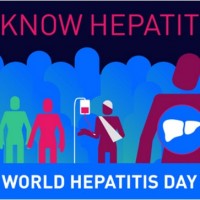July is International Hepatitis Awareness Month
Preventative healthcare is important for seniors - many diseases are more likely to form as people age, and typically the most effective treatments are the ones that start early on in an illness' development. While many of these processes have been well known for years - auditory screenings to check for hearing lost, colonoscopies to detect colon cancer - but new research from the Centers for Disease Control highlights a health test that many seniors may not know they need: hepatitis C screening.
The risk of hepatitis C for seniors
According to the CDC report, more than 75 percent of the adults currently living with hepatitis C were born between 1945 and 1965 - meaning older adults are five times more likely to have the disease than any other age group.
"Seniors could be infected without even knowing it."
Researchers suggest that this could be the result of minimal testing in the 70s and 80s when the spread of the disease was at its highest. It's passed along through blood-to-blood contact. While people who were engaged in high-risk activities may already be aware of their potential exposure and go to get tested, many others may be completely unaware that they could carry the virus. Since blood and organs that were donated during this time period didn't fall under the same testing requirements they are today, it's possible that some people were infected after receiving blood transfusions.
This illness is particularly problematic because it can remain asymptomatic for years. Seniors could be infected without knowing, increasing the chances that they could inadvertently pass it on to someone else. Hepatitis C can create chronic liver problems, so treatment is imperative. Without the knowledge that they're infected, however, many seniors could succumb to the illness before they can get the care they need.
What is hepatitis C?
The hepatitis viruses attack the liver. Type C is one of the most pervasive, along with types A and B. These strains have slightly different ways of being transmitted and impact patients at different rates. Type A, for example, will set in a few months after infection.
Type C, meanwhile, can remain dormant in a person's body for decades before it begins to destroy the liver - the American Liver Foundation reported that 75 to 85 percent of people infected with hepatitis C develop the long-term, chronic version of the condition.
Though the effects of the disease may be mild in some instances, this is usually dependent on quick treatment. In more severe cases, untreated hep C can lead to cirrhosis, liver cancer or liver failure. About 70 percent of people carrying the hep C virus will develop a form of liver disease.
Getting seniors tested for hepatitis
Identifying a hepatitis C infection is done through a series of blood tests to check liver enzyme levels. Doctors may opt to repeat testing after a few months to be sure of the results.
This isn't always a common screening for physicians to perform unprompted, however. A team of researchers at the University of Michigan Health System has developed an electronic alert system that can remind doctors to test patients who were born in the 1945 to 1965 window to help stop the disease from being overlooked. In the limited release of the alert system, the researchers saw an increase in the number of hepatitis screenings performed across all demographics.
While such programs may help more patients get the screening they need, widespread versions of alert systems have not been implemented yet. As a result, any senior who may be at risk for the disease should talk to their medical care team about getting screened. Even when the disease starts to scar the liver, there are usually no visible, outward side effects. Even people who currently feel healthy should ask for a hep C screening.
Treating seniors with hepatitis C
Care options for hep C have greatly advanced over the years. There are several medications that doctors can prescribe to send the disease into remission and help those infected continue to live healthy lives. Some prescriptions can even help treat cirrhosis and other impacts on the liver that were caused by the virus.
While medications will help reduce the damages of hepatitis C, patients will need to focus on some healthy living choices on their own as well. Consuming alcohol, for example, is highly discouraged for people who have hep C. Drinking can increase liver damage and make it harder for the body to fight infection.
Eating well and exercising are important for seniors' liver health. Diets rich in iron and protein are beneficial. Seniors should eat plenty of grains, fruits, and vegetables as well, and need to avoid salty, sugary and fatty foods. Poor diets can exacerbate liver problems. Patients will need to maintain a healthy weight, as excess body fat can harm the liver as well.
At CareOne Senior Care, we are proud to write on an array of topics that brings awareness to our community, friends, family, and those that we care for every day. For daily postings ranging in subjects from Alzheimer’s Care to Retirement Planning please follow us on Facebook or Twitter.
Type the title here
Type the text here



